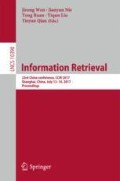Abstract
The existing discourse relation recognition systems have distinctive advantages, such as superior classification models, reliable feature selection, or holding rich training data. This shows the feasibility of making the systems collaborate with each other within a uniform framework. In this paper, we propose a stacked learning based collaborative approach. By the two-level learning, it facilitates the application of the confidence of different systems for the discourse relation determination. Experiments on PDTB show that our method yields promising improvement.
Access this chapter
Tax calculation will be finalised at checkout
Purchases are for personal use only
References
Brown, P.F., Desouza, P.V., Mercer, R.L., Pietra, V.J.D., Lai, J.C.: Class-based n-gram models of natural language. Comput. Linguist. 18(4), 467–479 (1992)
Chang, C.C., Lin, C.J.: Libsvm: a library for support vector machines. ACM Trans. Intell. Syst. Technol. (TIST) 2(3), 27 (2011)
Chen, J., Zhang, Q., Liu, P., Qiu, X., Huang, X.: Implicit discourse relation detection via a deep architecture with gated relevance network. In: Proceedings of the 54th Annual Meeting of the Association for Computational Linguistics (vol. 1 - Long Papers), pp. 1726–1735. Association for Computational Linguistics, Berlin, Germany (2016). http://www.aclweb.org/anthology/p16-1163
Hong, Y., Zhou, X., Che, T., Yao, J., Zhu, Q., Zhou, G.: Cross-argument inference for implicit discourse relation recognition. In: Proceedings of the 21st ACM International Conference on Information and Knowledge Management, pp. 295–304. ACM (2012)
Ji, Y., Eisenstein, J.: One vector is not enough: entity-augmented distributed semantics for discourse relations. Trans. Assoc. Comput. Linguist. 3, 329–344 (2015). https://tacl2013.cs.columbia.edu/ojs/index.php/tacl/article/view/536
Lan, M., Xu, Y., Niu, Z.Y., et al.: Leveraging synthetic discourse data via multi-task learning for implicit discourse relation recognition. In: ACL, vol. 1, pp. 476–485. Citeseer (2013)
Levin, B.: English Verb Classes and Alternations: A Preliminary Investigation. University of Chicago Press, Chicago (1993)
Li, J.J., Nenkova, A.: Reducing sparsity improves the recognition of implicit discourse relations. In: Proceedings of the 15th Annual Meeting of the Special Interest Group on Discourse and Dialogue, p. 199. Citeseer (2014)
Li, J.J., Nenkova, A.: Reducing sparsity improves the recognition of implicit discourse relations. In: SIGDIAL Conference, pp. 199–207. The Association for Computer Linguistics (2014). http://dblp.uni-trier.de/db/conf/sigdial/sigdial2014.html#LiN14a
Lin, Z., Kan, M.Y., Ng, H.T.: Recognizing implicit discourse relations in the penn discourse treebank. In: Proceedings of the Conference on Empirical Methods in Natural Language Processing, pp. 343–351. Association for Computational Linguistics (2009)
Liu, Y., Li, S.: Recognizing implicit discourse relations via repeated reading: neural networks with multi-level attention. In: Proceedings of the 2016 Conference on Empirical Methods in Natural Language Processing, pp. 1224–1233. Association for Computational Linguistics, Austin, Texas (2016). https://aclweb.org/anthology/D16-1130
Martins, A.F., Das, D., Smith, N.A., Xing, E.P.: Stacking dependency parsers. In: Proceedings of the Conference on Empirical Methods in Natural Language Processing, pp. 157–166. Association for Computational Linguistics (2008)
McKeown, K., Biran, O.: Aggregated word pair features for implicit discourse relation disambiguation. In: Proceedings of the 51th Annual Meeting of the Association for Computational Linguistics, pp. 69–73. Association for Computational Linguistics (2013)
Park, J., Cardie, C.: Improving implicit discourse relation recognition through feature set optimization. In: Proceedings of the 13th Annual Meeting of the Special Interest Group on Discourse and Dialogue, pp. 108–112. Association for Computational Linguistics (2012)
Pitler, E., Louis, A., Nenkova, A.: Automatic sense prediction for implicit discourse relations in text. In: Proceedings of the Joint Conference of the 47th Annual Meeting of the ACL and the 4th International Joint Conference on Natural Language Processing of the AFNLP, vol. 2, pp. 683–691. Association for Computational Linguistics (2009)
Prasad, R., Dinesh, N., Lee, A., Miltsakaki, E., Robaldo, L., Joshi, A.K., Webber, B.L.: The penn discourse treebank 2.0. In: LREC. Citeseer (2008)
Socher, R., Pennington, J., Huang, E.H., Ng, A.Y., Manning, C.D.: Semi-supervised recursive autoencoders for predicting sentiment distributions. In: Proceedings of the Conference on Empirical Methods in Natural Language Processing, pp. 151–161. Association for Computational Linguistics (2011)
Søgaard, A.: Simple semi-supervised training of part-of-speech taggers. In: Proceedings of the 48th Annual Meeting of the Association for Computational Linguistics, pp. 205–208. Association for Computational Linguistics (2010)
Stone, P., Dunphy, D.C., Smith, M.S., Ogilvie, D.: The general inquirer: a computer approach to content analysis. J. Regional Sci. 8(1), 113–116 (1968)
Wang, X., Li, S., Li, J., Li, W.: Implicit discourse relation recognition by selecting typical training examples. In: Proceedings of the 24th International Conference on Computational Linguistics: Posters, pp. 2757–2772. Association for Computational Linguistics (2012)
Wilson, T., Wiebe, J., Hoffmann, P.: Recognizing contextual polarity in phrase-level sentiment analysis. In: Proceedings of the Conference on Human Language Technology and Empirical Methods in Natural Language Processing, pp. 347–354. Association for Computational Linguistics (2005)
Witten, I.H., Frank, E.: Data Mining: Practical Machine Learning Tools and Techniques. Morgan Kaufmann, San Francisco (2005)
Zhang, B., Su, J., Xiong, D., Lu, Y., Duan, H., Yao, J.: Shallow convolutional neural network for implicit discourse relation recognition. In: Proceedings of the Conference on Empirical Methods in Natural Language Processing, pp. 2230–2235. Association for Computational Linguistics (2015)
Zhou, Z.M., Xu, Y., Niu, Z.Y., Lan, M., Su, J., Tan, C.L.: Predicting discourse connectives for implicit discourse relation recognition. In: Proceedings of the 23rd International Conference on Computational Linguistics: Posters, pp. 1507–1514. Association for Computational Linguistics (2010)
Acknowledgments
This research is supported by the National Natural Science Foundation of China, No. 61373097, No. 61672368, No. 61672367, No. 61331011. The authors would like to thank the anonymous reviewers for their insightful comments and suggestions. Yu Hong, Professor Associate in Soochow University, is the corresponding author of the paper, whose email address is tianxianer@gmail.com.
Author information
Authors and Affiliations
Corresponding author
Editor information
Editors and Affiliations
Rights and permissions
Copyright information
© 2017 Springer International Publishing AG
About this paper
Cite this paper
Xu, Y., Ruan, H., Hong, Y. (2017). Stacked Learning for Implicit Discourse Relation Recognition. In: Wen, J., Nie, J., Ruan, T., Liu, Y., Qian, T. (eds) Information Retrieval. CCIR 2017. Lecture Notes in Computer Science(), vol 10390. Springer, Cham. https://doi.org/10.1007/978-3-319-68699-8_13
Download citation
DOI: https://doi.org/10.1007/978-3-319-68699-8_13
Published:
Publisher Name: Springer, Cham
Print ISBN: 978-3-319-68698-1
Online ISBN: 978-3-319-68699-8
eBook Packages: Computer ScienceComputer Science (R0)

